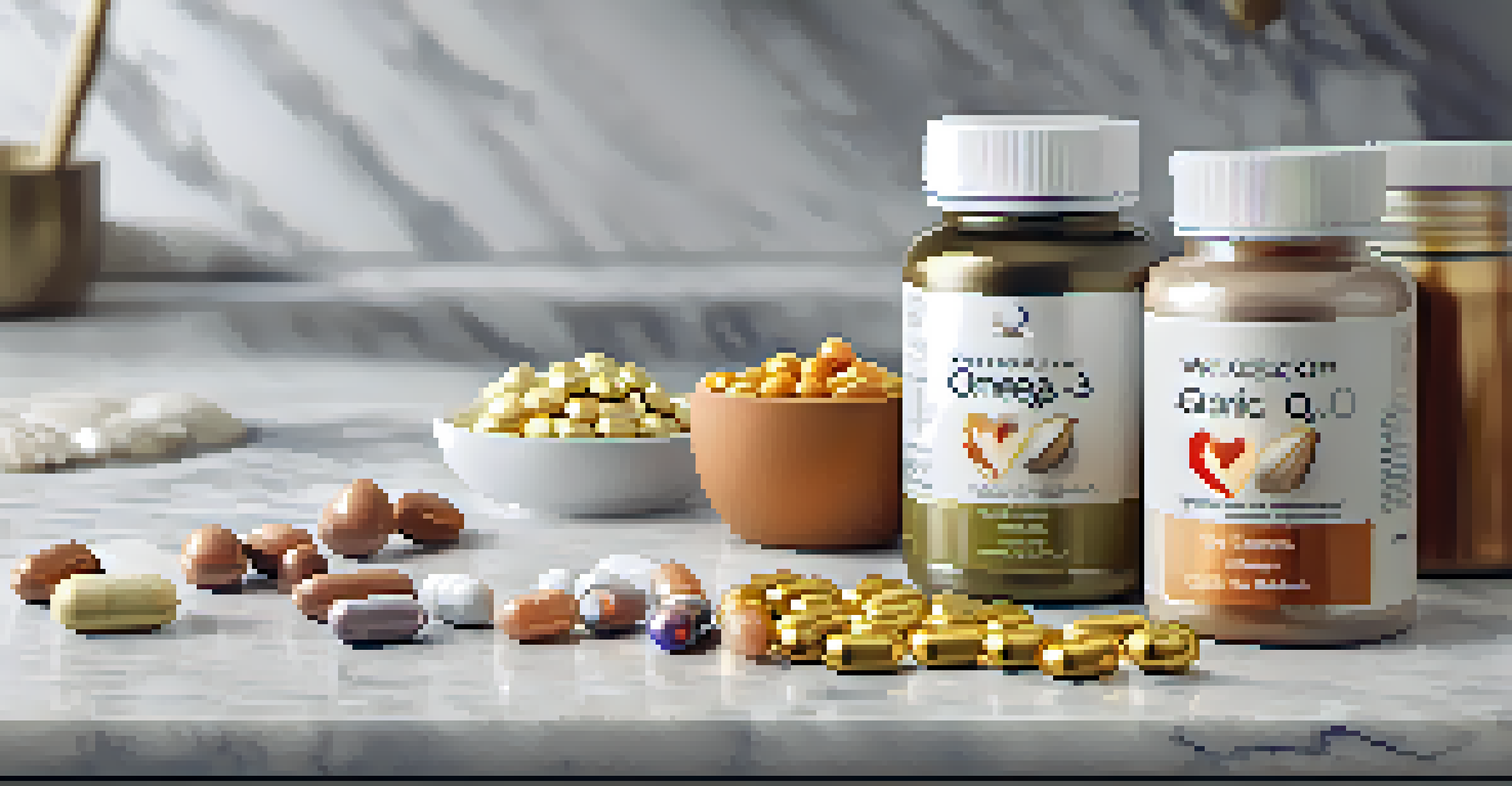Herbs and Supplements to Support Heart Function Naturally

Understanding Heart Function and Its Importance
The heart is often called the body's engine, tirelessly pumping blood to nourish every cell. Understanding how it functions is key to maintaining its health. Factors like diet, exercise, and stress greatly influence heart performance.
The heart is a house of many rooms, and we must learn to keep them all healthy.
Heart function is not just about strength; it also involves rhythm and efficiency. A well-functioning heart can adapt to physical demands, ensuring optimal oxygen and nutrient delivery. When the heart struggles, it can lead to various health issues.
Supporting heart health naturally often involves lifestyle choices and the incorporation of specific herbs and supplements. These can work synergistically to promote better heart function, reducing the risk of cardiovascular diseases.
The Role of Omega-3 Fatty Acids in Heart Health
Omega-3 fatty acids are essential fats that our body cannot produce on its own. They play a crucial role in reducing inflammation and improving heart health. Common sources include fatty fish, flaxseeds, and walnuts.

Research indicates that Omega-3s can lower triglyceride levels, reduce blood pressure, and decrease the risk of heart rhythm disorders. Incorporating these into your diet may support overall cardiovascular health.
Heart Health Requires Lifestyle Choices
Maintaining heart function involves regular exercise, a balanced diet, and effective stress management.
For those who may not get enough Omega-3s through food, supplements like fish oil or algae oil can be effective alternatives. However, it's essential to consult a healthcare provider for personalized advice.
Garlic: A Natural Aid for Cardiovascular Support
Garlic has been used for centuries not just as a flavor enhancer but also for its medicinal properties. This humble bulb is known to help lower cholesterol levels and improve circulation, making it beneficial for heart health.
The greatest wealth is health.
The active compound allicin is believed to be responsible for garlic's heart-friendly effects. It can help relax blood vessels, promoting better blood flow and reducing blood pressure.
Incorporating fresh garlic into meals or taking garlic supplements can be a simple way to enhance heart function. However, moderation is key, as excessive amounts may lead to digestive discomfort.
Coenzyme Q10: A Powerhouse for Heart Energy
Coenzyme Q10 (CoQ10) is a compound that helps generate energy in every cell of the body, particularly in the heart. As we age, natural levels of CoQ10 can decline, potentially impacting heart function.
This supplement is believed to improve heart health by reducing oxidative stress and supporting overall energy production. It may also assist those with certain heart conditions by improving symptoms and enhancing quality of life.
Omega-3s Boost Heart Function
Incorporating Omega-3 fatty acids can lower triglycerides and support overall cardiovascular health.
Adding CoQ10 to your regimen can be beneficial, especially for older adults or those on cholesterol-lowering medications. Always consult with a healthcare professional for tailored advice on dosage.
The Benefits of Hawthorn for Heart Function
Hawthorn is a flowering plant known for its rich history in herbal medicine, particularly for heart health. The berries and leaves are believed to improve blood flow and support overall cardiovascular well-being.
Studies suggest that hawthorn may help strengthen heart contractions and improve exercise tolerance in individuals with heart issues. Its antioxidant properties also play a role in protecting heart cells from damage.
Hawthorn can be consumed as a tea, tincture, or in supplement form. As with any herbal remedy, it's advisable to consult with a healthcare provider to ensure safety and effectiveness.
Turmeric: A Spice with Heart-Healthy Properties
Turmeric, often touted for its anti-inflammatory benefits, contains curcumin, a powerful compound that may support heart health. Its anti-inflammatory properties can help reduce the risk of heart disease by improving blood vessel function.
Research indicates that curcumin may also help lower cholesterol levels and prevent the oxidation of LDL (bad cholesterol), which is crucial for maintaining artery health. This makes turmeric a valuable addition to a heart-healthy diet.
Herbs and Supplements Aid Heart
Natural remedies like garlic, CoQ10, and hawthorn can enhance heart health and function.
Incorporating turmeric in cooking or taking curcumin supplements can be a great way to harness its benefits. However, pairing it with black pepper enhances absorption, maximizing its effectiveness.
Magnesium: An Essential Mineral for Heart Rhythm
Magnesium is a vital mineral that plays numerous roles in the body, including supporting heart health. It helps regulate heart rhythm and maintain proper blood pressure levels, making it essential for cardiovascular function.
A deficiency in magnesium can lead to arrhythmias and other heart-related issues, emphasizing the need for adequate intake. Foods rich in magnesium include leafy greens, nuts, seeds, and whole grains.

For those struggling to get enough magnesium from diet alone, supplements can be beneficial. As with any supplement, it's essential to discuss with a healthcare provider to determine the right dosage and form.
Lifestyle Changes for Enhanced Heart Function
While herbs and supplements play a role in heart health, lifestyle choices are equally important. Regular physical activity, a balanced diet, and stress management can significantly enhance heart function.
Engaging in activities you enjoy, whether it’s walking, dancing, or yoga, can help improve cardiovascular health while boosting your mood. Incorporating heart-healthy foods like fruits, vegetables, and whole grains into your meals is also crucial.
Remember, small changes can lead to significant improvements over time. By combining natural supplements with a heart-healthy lifestyle, you can create a powerful strategy for supporting your heart's function.